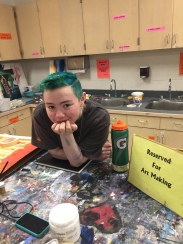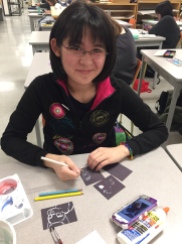My day of compassion
On Friday September 6th,2013 I attempted to complete my day of compassion. For this project I will refer to compassion as the sympathetic consciousness of others’ distress together with a desire to alleviate it (http://www.merriam-webster.com/dictionary/compassion
). I had two main goals for myself: 1) to be aware of the needs of my husband, son and daughter who had just moved to Japan two days earlier, and to respond to their fears and concerns with patience, compassion and understanding. 2) to be aware of the needs of the students I would be teaching English to in Tarui,
Background:
I moved to Tarui, Japan on July 30, 2013. I was hired to be an assistant English teacher and Coordinator of International Relations between my home school board the Calgary Catholic School District in Canada and the Tarui School Board in Japan. The partnership between Calgary and Tarui first began 25 years ago. It involves encouraging students from each country to learn about the other students language, customs and culture in order to create social awareness. My position this year is to work with the Japanese English teachers, as well as coordinate the 40 Japanese students who will be visiting Calgary in March as part of a homestay experience. I am particularly excited to have this position because 22 years ago when I was a junior high student, I had one of the first set of Tarui students stay at my home in Calgary. Now, as an adult, I have the opportunity to allow other students the same wonderful experience.
In order to accept this position I had to be willing to relocate to Tarui Japan from Calgary, Alberta Canada for one year. I discussed this opportunity with my husband (39), son (8) and daughter(5) and they all agreed that it would be a great opportunity for our family. In Canada we were used to being a member of the majority and had never really experienced what it might be like for the many immigrant families who are new to Canada and do not speak the language, read, or understand our customs and traditions. Moving to Japan would be a real eye opener for us all.
We had decided that the best way to do this would be for me to move to Japan at the start of my contact on July 30th, and then my husband and children would come to Japan on September 3rd
after spending the summer with friends and family. This also allowed me to come to Japan first and to make sure that the house, schooling and other necessities would be ready for my family when they arrived.
Goal 1:
When my family arrived in Japan on September 3rd, I had already been in Japan for one month and had started to adjust to the culture shock. I was starting to understand how to read certain signs, how to ride the subway and even how to turn on the gas stove at our house. For my family, however everything was brand new and overwhelming. They had many questions about how and why to do everything. Sometimes the questions would feel frustrating because even after only one month I already thought that the answer was obvious, I needed to be very aware of the tone of voice I was using to explain everything to them because when you are new to a situation everything feels more threatening. I needed to make a conscious effort to slow down my speech, explain things multiple times and allow them the space to feel just as scared and overwhelmed as I had felt, without shame.
I never told my family about this project before I started, it was just a gift that I wanted to give to them, yet even with my best intentions I found myself slipping every once in a while back into an impatient tone. For- example- my husband asked why we had to fold the futons up every day. Instead of patiently explaining that folding the futons would create more space in the house and reduce the likelihood of mold, I responded shortly `just because ok`. This response was uncompassionate and I felt guilty after saying it, especially as I was aware that I had set the goal to be more compassionate. I noticed that when I was rushed (trying to head out the door on my way to work), or speaking to my husband from another room, I was less likely to respond in a compassionate manner. However, when I took the time to slow down, look into the faces of my family members and actually think about what they might be feeling I was able to remain true to my goal. The more connected I felt to my family the more compassionate I seemed to be able to be.
Goal 2:
Part of my position is to work in the Junior High schools to teach English. For non-native speakers English can be a very confusing language which is difficult to learn. The pace of speech and vocabulary can also be very challenging for students. When I am working with students I want to be able to create the best conditions possible to help them to feel successful as learners.
Students started back to school from summer vacation on Sept 2. Starting September 5th I had been asked to go into the various classrooms and introduce myself to the
students and speak about my family and life in Canada. I had made a power point presentation to use for this introduction.
The first presentation that I did for a class, on Thursday, went ok. I had not consciously reflected on the speed and level of language and the teacher told me that she thought the presentation might have been a little too difficult for the students in the class. I decided to revamp my presentation to be able to meet the needs of my students.
On Friday Sept 6, 2013, I entered Fuwa Junior High with my second day of compassion goal in mind to be aware of the needs of the students I would be teaching English to in Tarui,. That day I had three presentations to do and after each presentation I reflected on what had happened and made some more minor adjustments to accommodate my students.
The first class, I used the same power point as the day before, however I significantly slowed down my speech and simplified my vocabulary. The students appeared to be following along with me fairly well. I asked the teacher for feedback at the end of the class and she said that she could tell that I was working on my language and speed but that asking the students to image different ideas was a little bit difficult.
The second class I continued to use the simpler speech and speed. In addition I tried to ask questions to help the students related to the experiences of students in Canada. For example: In Canada we have snow (point to the photo), Do you have snow? Please raise your hand if you have snow. (this allowed the students to respond to the lesson without having to think of all the words for the sentence). I noticed an improvement in the quality of the interaction between myself and my students, but I still wondered if there was more I could do to help facilitate the connection.
For the third class I decided to speak to the teacher before class and ask for any advice that she might have regarding teaching her students. She said that students may have trouble thinking of questions to ask me on their own so if we gave them an opportunity to brainstorm in small groups I may have a better response. In order to allow time to brainstorm I also created a shorter power point presentation.
The third class was by far the best and most interactive class that I taught that day. By being aware of the students nervousness to ask questions, and working to alleviate that stress by allowing them an opportunity to develop and practice asking questions in small groups before Iasked them to respond in front of the whole group I was able to create a positive learning experience for both myself and my students.
The Day of Compassion project was personally very beneficial to me as it taught me a few very important factors about myself that I should easily be able to implement to help me to continue to live my life in a compassionate manner.
1) I need to slow down and look at my family before I respond to them. Similar to the experiment with the seminarian students (lecture 3.2) I need to be reminded of my emotional connection to my family. They are important to me and should be a priority.
2) Pace, language and vocabulary is important. Students need time to process the new language that they are learning.
3) Allowing students opportunities to practice in non-threatening situations (small group) before moving them into more threatening (large group) situations will alleviate their discomfort and result in more academic growth.
4) Finally, my experience in Japan in general, has taught me of the need to slow down and look around. Sometimes people require reassurance even if they don`t ask for it directly.
I am very
happy that I will be able to spend the year in Japan. I believe that this
experience of being new and an outsider will increase the compassion I will
feel towards families new to Canada. This experience will impact my practice as
a school counselor in Canada in many ways including the fact that I will always
try to make sure I book a translator to attend any meetings that I have with a
family whose first language is not English
















